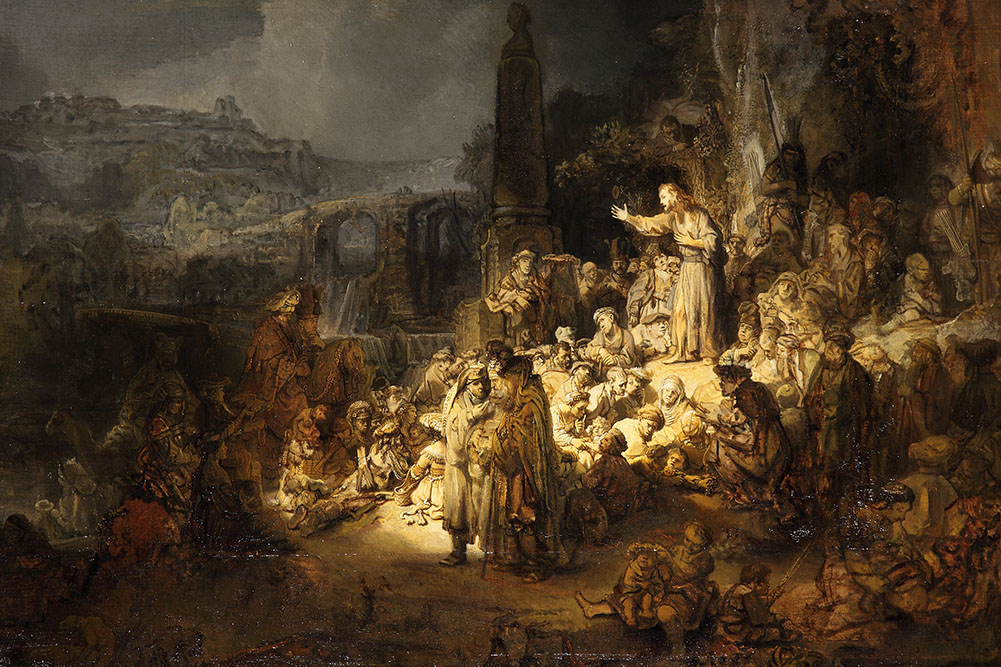
"The Sermon of John the Baptist" (1634-35) by Rembrandt (Staatlichen Museen zu Berlin)
When I lived in Peru, I knew a holy woman who always led the town in the traditional novena that prepared them for their big feast. She had a wonderful voice and she projected it so that a large crowd could hear her read those prayers at something close to the speed of sound. Everyone came in with a great "Amen" at all the appropriate places.
For us sisters whose first language was English, understanding her recitations was quite a challenge. Eventually, we realized that something seemed off — the prayers didn't make sense; we were calling on God to do some ungodly things.
When she sat down to explain the rituals to us, she realized that there were a couple of pages missing in her prayer book — she was skipping over very important parts that would have made sense of what came later. We enjoyed the irony that it took people who spoke poor Spanish to figure that out!
Today, we hear some of Isaiah's most famous lines, "Prepare the way of the Lord! ... The glory of the Lord shall be revealed. All people shall see it together."
Handel has taught us a magnificent way to sing about this and there are easier versions in which we can lift our voices with the same message, but what does it mean? Is it just a nice song, or is it supposed to indicate something important in our lives? (How often do we pay such close attention to the words of our hymns and prayers that they change the way we live?)
The beginning of Mark's Gospel offers us a perspective on preparing the way of the Lord. Mark tells us that John the Baptist proclaimed a "baptism of repentance for the forgiveness of sin."
Believe it or not, John and his message of conversion were immensely popular! Great joy doesn't sound exactly like the emotion brought forth by a call to "repentance" and acknowledgement of sin. What's going on?
John's call to "repentance" wasn't an invitation to penance. He was inviting people to see everything in life from a new perspective. Instead of concentrating on the past, on what they had done wrong or lost, John, like Isaiah, invited people to focus on God's promised future — a future he told them was about to dawn.
John's call to 'repentance' wasn't an invitation to penance. He was inviting people to see everything in life from a new perspective.
What would that future be like? Not even John could really envision it — he sent disciples to ask Jesus if he was the "one to come, or should we look for another?"
Jesus didn't fit the typical expectations for messiahs. To understand him, people had to return to Isaiah and ask about the servant he described.
Isaiah wrote to people who imagined their lives as a desert wasteland. Life was dry, and arduous the road that led to unscalable mountains. Isaiah invited people under this depressing spell to listen to glad tidings, to discern the presence of God's alluring love among them.
It was not that mountains and valleys would actually disappear from their way, but the energy of divine grace would open their eyes to a future that would come into reality with each step they took toward it.
The repentance of which John and Jesus spoke did not look backward. It was a vision of an unimaginable different future so attractive that nobody need remain stuck or freeze another in their former ways. The "strong arm" of the Lord is not coercive; the rule of God is a hand up to those who desire the grace to move forward into the type of future for which we were created.
Advertisement
Today, between two major feasts of the Virgin Mary, we can look to her for inspiration. Her prayer, "Let it happen through me according to your word," came not so much from a vision, but from trust that God had more in mind for her than she could imagine.
Elizabeth proclaimed that in one simple phrase that could be translated as "Blessed are you who believed that God's promise would be fulfilled" (Luke 1:45).
The Second Letter of St. Peter says it this way: "Conduct yourselves in holiness and devotion ... hastening the coming of the day of our God."
The Second Sunday of Advent calls us into the sort of waiting that actually hastens the fulfillment of God's reign among us. Like Mary — the Christian Scriptures' counterpart of Abraham who forged into the unknown at God's invitation — we are invited to believe so strongly in God's future that we will not hesitate to risk what it takes for it to come about. Our daily prayer is simple and straightforward, "Thy kingdom come, thy will be done."
Will those words direct our lives or simply be rote phrases to which we can say, "Amen," without feeling their power?
